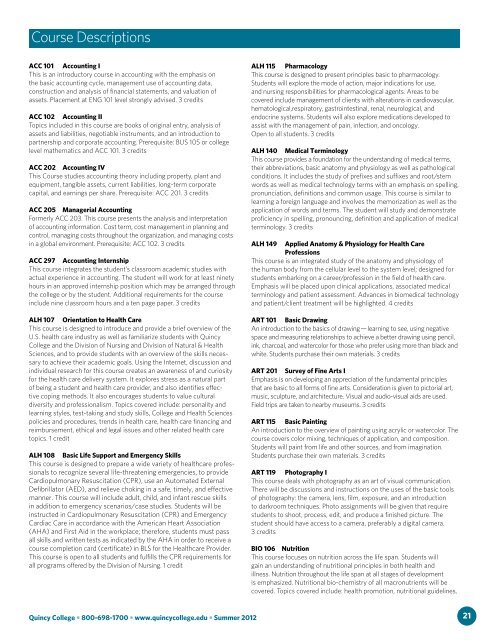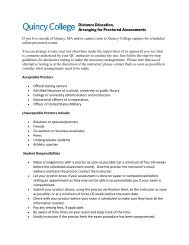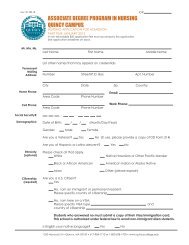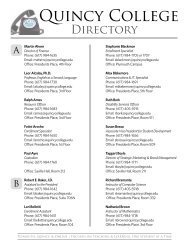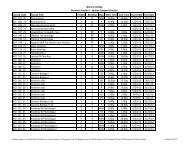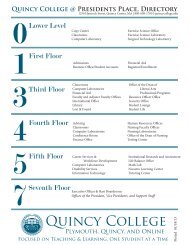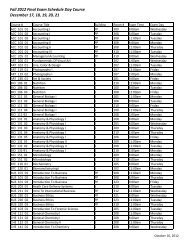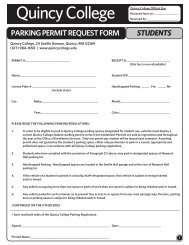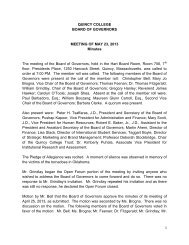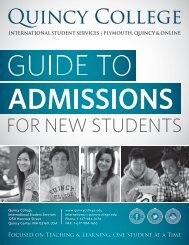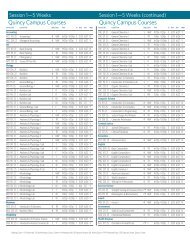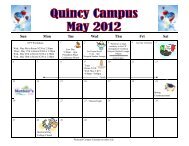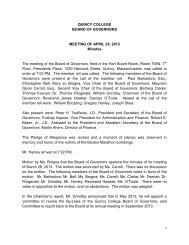Quincy College
Quincy College
Quincy College
Create successful ePaper yourself
Turn your PDF publications into a flip-book with our unique Google optimized e-Paper software.
Course Descriptions<br />
ACC 101 Accounting I<br />
This is an introductory course in accounting with the emphasis on<br />
the basic accounting cycle, management use of accounting data,<br />
construction and analysis of financial statements, and valuation of<br />
assets. Placement at ENG 101 level strongly advised. 3 credits<br />
ACC 102 Accounting II<br />
Topics included in this course are books of original entry, analysis of<br />
assets and liabilities, negotiable instruments, and an introduction to<br />
partnership and corporate accounting. Prerequisite: BUS 105 or college<br />
level mathematics and ACC 101. 3 credits<br />
ACC 202 Accounting IV<br />
This Course studies accounting theory including property, plant and<br />
equipment, tangible assets, current liabilities, long-term corporate<br />
capital, and earnings per share. Prerequisite: ACC 201. 3 credits<br />
ACC 205 Managerial Accounting<br />
Formerly ACC 203. This course presents the analysis and interpretation<br />
of accounting information. Cost term, cost management in planning and<br />
control, managing costs throughout the organization, and managing costs<br />
in a global environment. Prerequisite: ACC 102. 3 credits<br />
ACC 297 Accounting Internship<br />
This course integrates the student’s classroom academic studies with<br />
actual experience in accounting. The student will work for at least ninety<br />
hours in an approved internship position which may be arranged through<br />
the college or by the student. Additional requirements for the course<br />
include nine classroom hours and a ten page paper. 3 credits<br />
ALH 107 Orientation to Health Care<br />
This course is designed to introduce and provide a brief overview of the<br />
U.S. health care industry as well as familiarize students with <strong>Quincy</strong><br />
<strong>College</strong> and the Division of Nursing and Division of Natural & Health<br />
Sciences, and to provide students with an overview of the skills necessary<br />
to achieve their academic goals. Using the Internet, discussion and<br />
individual research for this course creates an awareness of and curiosity<br />
for the health care delivery system. It explores stress as a natural part<br />
of being a student and health care provider, and also identifies effective<br />
coping methods. It also encourages students to value cultural<br />
diversity and professionalism. Topics covered include: personality and<br />
learning styles, test-taking and study skills, <strong>College</strong> and Health Sciences<br />
policies and procedures, trends in health care, health care financing and<br />
reimbursement, ethical and legal issues and other related health care<br />
topics. 1 credit<br />
ALH 108 Basic Life Support and Emergency Skills<br />
This course is designed to prepare a wide variety of healthcare professionals<br />
to recognize several life-threatening emergencies, to provide<br />
Cardiopulmonary Resuscitation (CPR), use an Automated External<br />
Defibrillator (AED), and relieve choking in a safe, timely, and effective<br />
manner. This course will include adult, child, and infant rescue skills<br />
in addition to emergency scenarios/case studies. Students will be<br />
instructed in Cardiopulmonary Resuscitation (CPR) and Emergency<br />
Cardiac Care in accordance with the American Heart Association<br />
(AHA) and First Aid in the workplace; therefore, students must pass<br />
all skills and written tests as indicated by the AHA in order to receive a<br />
course completion card (certificate) in BLS for the Healthcare Provider.<br />
This course is open to all students and fulfills the CPR requirements for<br />
all programs offered by the Division of Nursing. 1 credit<br />
ALH 115 Pharmacology<br />
This course is designed to present principles basic to pharmacology.<br />
Students will explore the mode of action, major indications for use,<br />
and nursing responsibilities for pharmacological agents. Areas to be<br />
covered include management of clients with alterations in cardiovascular,<br />
hematological,respiratory, gastrointestinal, renal, neurological, and<br />
endocrine systems. Students will also explore medications developed to<br />
assist with the management of pain, infection, and oncology.<br />
Open to all students. 3 credits<br />
ALH 140 Medical Terminology<br />
This course provides a foundation for the understanding of medical terms,<br />
their abbreviations, basic anatomy and physiology as well as pathological<br />
conditions. It includes the study of prefixes and suffixes and root/stem<br />
words as well as medical technology terms with an emphasis on spelling,<br />
pronunciation, definitions and common usage. This course is similar to<br />
learning a foreign language and involves the memorization as well as the<br />
application of words and terms. The student will study and demonstrate<br />
proficiency in spelling, pronouncing, definition and application of medical<br />
terminology. 3 credits<br />
ALH 149 Applied Anatomy & Physiology for Health Care<br />
Professions<br />
This course is an integrated study of the anatomy and physiology of<br />
the human body from the cellular level to the system level; designed for<br />
students embarking on a career/profession in the field of health care.<br />
Emphasis will be placed upon clinical applications, associated medical<br />
terminology and patient assessment. Advances in biomedical technology<br />
and patient/client treatment will be highlighted. 4 credits<br />
ART 101 Basic Drawing<br />
An introduction to the basics of drawing — learning to see, using negative<br />
space and measuring relationships to achieve a better drawing using pencil,<br />
ink, charcoal, and watercolor for those who prefer using more than black and<br />
white. Students purchase their own materials. 3 credits<br />
ART 201 Survey of Fine Arts I<br />
Emphasis is on developing an appreciation of the fundamental principles<br />
that are basic to all forms of fine arts. Consideration is given to pictorial art,<br />
music, sculpture, and architecture. Visual and audio-visual aids are used.<br />
Field trips are taken to nearby museums. 3 credits<br />
ART 115 Basic Painting<br />
An introduction to the overview of painting using acrylic or watercolor. The<br />
course covers color mixing, techniques of application, and composition.<br />
Students will paint from life and other sources, and from imagination.<br />
Students purchase their own materials. 3 credits<br />
ART 119 Photography I<br />
This course deals with photography as an art of visual communication.<br />
There will be discussions and instructions on the uses of the basic tools<br />
of photography: the camera, lens, film, exposure, and an introduction<br />
to darkroom techniques. Photo assignments will be given that require<br />
students to shoot, process, edit, and produce a finished picture. The<br />
student should have access to a camera, preferably a digital camera.<br />
3 credits<br />
BIO 106 Nutrition<br />
This course focuses on nutrition across the life span. Students will<br />
gain an understanding of nutritional principles in both health and<br />
illness. Nutrition throughout the life span at all stages of development<br />
is emphasized. Nutritional bio-chemistry of all macronutrients will be<br />
covered. Topics covered include: health promotion, nutritional guidelines,<br />
<strong>Quincy</strong> <strong>College</strong> • 800-698-1700 • www.quincycollege.edu • Summer 2012 21


